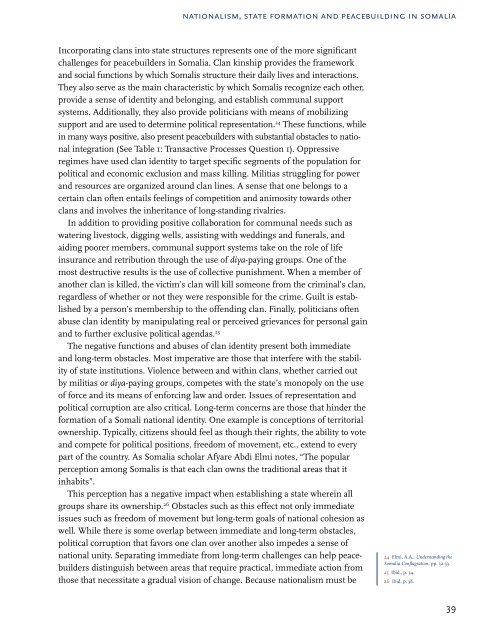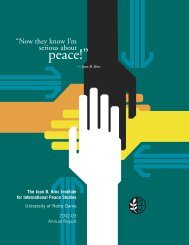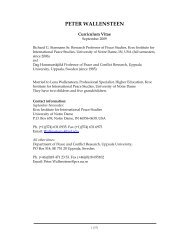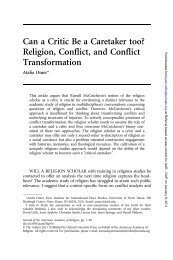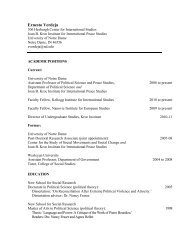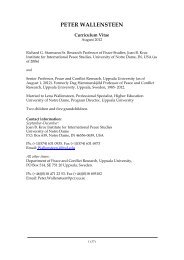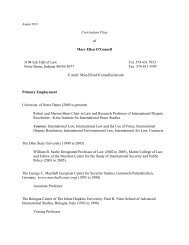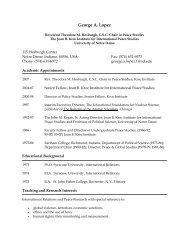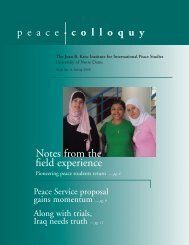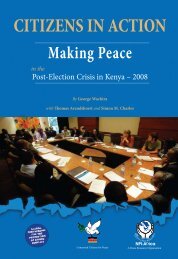Somalia: Creating Space for Fresh Approaches to Peacebuilding
Somalia: Creating Space for Fresh Approaches to Peacebuilding
Somalia: Creating Space for Fresh Approaches to Peacebuilding
Create successful ePaper yourself
Turn your PDF publications into a flip-book with our unique Google optimized e-Paper software.
nationalism, state <strong>for</strong>mation and peacebuilding in somalia<br />
Incorporating clans in<strong>to</strong> state structures represents one of the more significant<br />
challenges <strong>for</strong> peacebuilders in <strong>Somalia</strong>. Clan kinship provides the framework<br />
and social functions by which Somalis structure their daily lives and interactions.<br />
They also serve as the main characteristic by which Somalis recognize each other,<br />
provide a sense of identity and belonging, and establish communal support<br />
systems. Additionally, they also provide politicians with means of mobilizing<br />
support and are used <strong>to</strong> determine political representation. 24 These functions, while<br />
in many ways positive, also present peacebuilders with substantial obstacles <strong>to</strong> national<br />
integration (See Table 1: Transactive Processes Question 1). Oppressive<br />
regimes have used clan identity <strong>to</strong> target specific segments of the population <strong>for</strong><br />
political and economic exclusion and mass killing. Militias struggling <strong>for</strong> power<br />
and resources are organized around clan lines. A sense that one belongs <strong>to</strong> a<br />
certain clan often entails feelings of competition and animosity <strong>to</strong>wards other<br />
clans and involves the inheritance of long-standing rivalries.<br />
In addition <strong>to</strong> providing positive collaboration <strong>for</strong> communal needs such as<br />
watering lives<strong>to</strong>ck, digging wells, assisting with weddings and funerals, and<br />
aiding poorer members, communal support systems take on the role of life<br />
insurance and retribution through the use of diya-paying groups. One of the<br />
most destructive results is the use of collective punishment. When a member of<br />
another clan is killed, the victim’s clan will kill someone from the criminal’s clan,<br />
regardless of whether or not they were responsible <strong>for</strong> the crime. Guilt is established<br />
by a person’s membership <strong>to</strong> the offending clan. Finally, politicians often<br />
abuse clan identity by manipulating real or perceived grievances <strong>for</strong> personal gain<br />
and <strong>to</strong> further exclusive political agendas. 25<br />
The negative functions and abuses of clan identity present both immediate<br />
and long-term obstacles. Most imperative are those that interfere with the stability<br />
of state institutions. Violence between and within clans, whether carried out<br />
by militias or diya-paying groups, competes with the state’s monopoly on the use<br />
of <strong>for</strong>ce and its means of en<strong>for</strong>cing law and order. Issues of representation and<br />
political corruption are also critical. Long-term concerns are those that hinder the<br />
<strong>for</strong>mation of a Somali national identity. One example is conceptions of terri<strong>to</strong>rial<br />
ownership. Typically, citizens should feel as though their rights, the ability <strong>to</strong> vote<br />
and compete <strong>for</strong> political positions, freedom of movement, etc., extend <strong>to</strong> every<br />
part of the country. As <strong>Somalia</strong> scholar Afyare Abdi Elmi notes, “The popular<br />
perception among Somalis is that each clan owns the traditional areas that it<br />
inhabits”.<br />
This perception has a negative impact when establishing a state wherein all<br />
groups share its ownership. 26 Obstacles such as this effect not only immediate<br />
issues such as freedom of movement but long-term goals of national cohesion as<br />
well. While there is some overlap between immediate and long-term obstacles,<br />
political corruption that favors one clan over another also impedes a sense of<br />
national unity. Separating immediate from long-term challenges can help peacebuilders<br />
distinguish between areas that require practical, immediate action from<br />
those that necessitate a gradual vision of change. Because nationalism must be<br />
24 Elmi, A.A., Understanding the<br />
<strong>Somalia</strong> Conflagration, pp. 32-33.<br />
25 Ibid., p. 34.<br />
26 Ibid, p. 38.<br />
39


